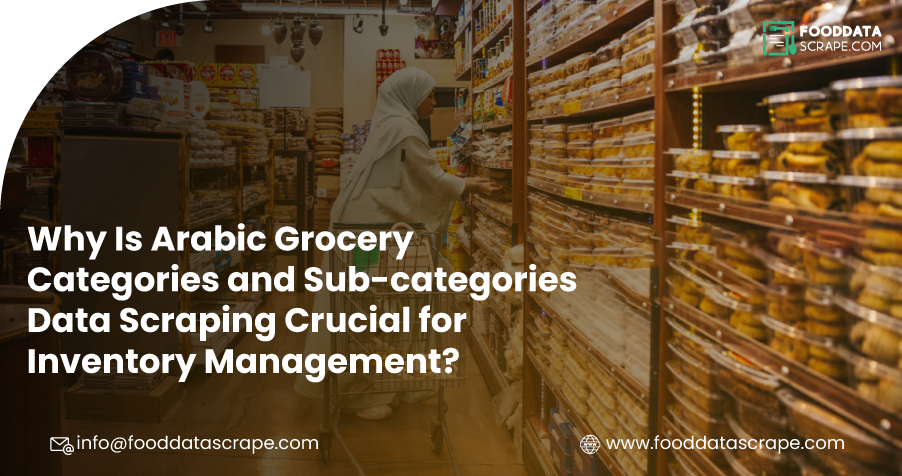Introduction
Digitization of the global grocery market has changed consumer shopping habits and business operations. This is more significant in the Arabic grocery market because of unique preferences, regional diversity, and an increasing demand for localized products. Therefore, businesses need actionable insights in this dynamic environment, which makes Arabic Grocery Categories and Sub-categories Data Scraping an essential tool.
Advanced Arabic Grocery Data Categorization Scraping Services will help companies extract and analyze structured data across various products to make more intelligent pricing, inventory management, and marketing strategy decisions. Access to datasets such as a 25,000-item Arabic Grocery Dataset can provide insights into consumer demand, regional trends, and competitor actions.
Such rich data helps businesses refine their operations and focus their product lines according to localized demand to stay relevant in this ever-changing Arabic grocery marketplace.
Why Focus on the Arabic Grocery Market?
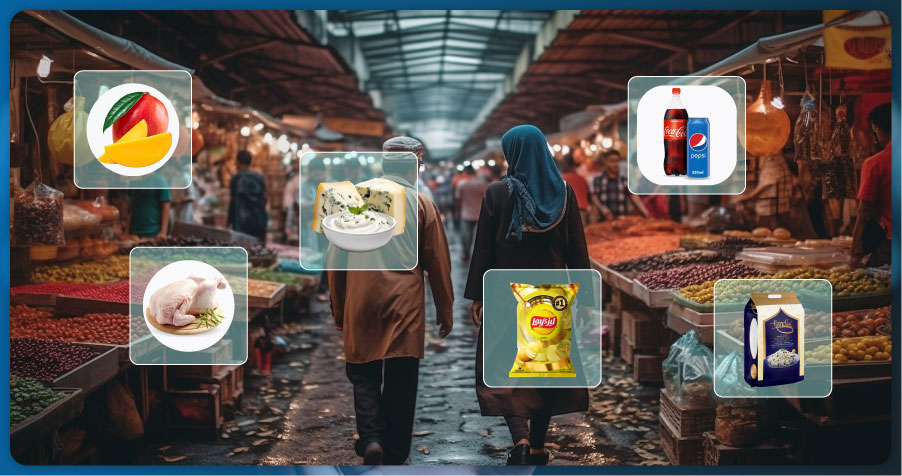
The Arabic grocery market is a complex yet thriving segment characterized by cultural diversity and specific consumer preferences. From halal meat to region-specific spices, the diversity in product demand is vast. Online grocery platforms such as Carrefour, Talabat, and Lulu Hypermarket are treasure troves of data for businesses. Arabic Grocery Product Sub-Categorization Scraping helps collect critical insights into product availability, pricing strategies, consumer preferences, and seasonal trends.
This market is driven by powerful consumer spending habits catalyzed by the GCC's growing middle class. Grocery App Data Scraping Services allow a business to Extract Arabic Categorize and Sub-categorize for Grocery Items, thus better comprehending market dynamics. Using these insights, firms can respond to localized needs, manage supply chains more effectively, and stay competitive in the new Arabic grocery landscape.
Key Grocery Categories and Subcategories in the Arabic Market
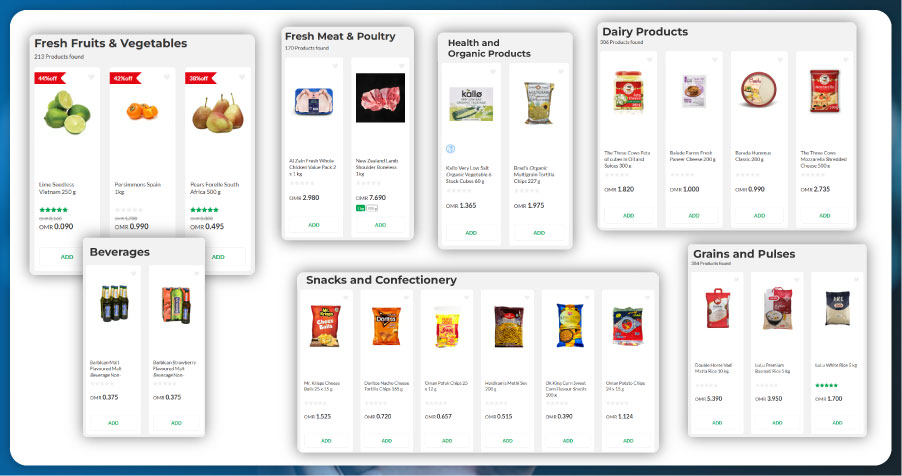
To tap into the opportunities of data scraping, it's essential to understand the key grocery categories and subcategories that define the Arabic market. These include:
1. Fresh Produce
- Fruits: Dates, figs, pomegranates, and imported tropical fruits.
- Vegetables: Eggplants, okra, zucchini, and leafy greens like parsley and mint.
- Herbs and Spices: Essential in Arabic cooking, with items like sumac, za'atar, and saffron.
2. Meat and Seafood
- Halal Meat: Beef, lamb, chicken, and goat, focusing strongly on halal certification.
- Seafood: Regional favorites like prawns, hammour fish, and other local catches.
3. Dairy Products
- Milk and Yogurt: Plain yogurt, labneh, and ayran.
- Cheese: Popular varieties such as halloumi, feta, and akawi.
4. Pantry Staples
- Grains and Pulses: Rice, lentils, chickpeas, and bulgur.
- Flour and Baking Essentials: Traditional flours for making flatbreads like khubz.
- Oils and Ghee: Olive oil, sesame oil, and clarified butter.
5. Snacks and Confectionery
- Sweet Treats: Baklava, maamoul, and basbousa.
- Savory Snacks: Pita chips, roasted nuts, and spiced crackers.
6. Beverages
- Traditional Drinks: Arabic coffee (qahwa), mint tea, and tamarind juice.
- Modern Options: Juices, carbonated drinks, and flavored waters.
7. Health and Organic Products
- Organic Produce: Free-range eggs, organic vegetables, and natural honey.
- Health Foods: Gluten-free products, protein powders, and herbal teas.
By scraping data across these categories and subcategories, businesses can unlock valuable information about product availability, demand fluctuations, and pricing trends.
Applications of Data Scraping in the Arabic Grocery Market
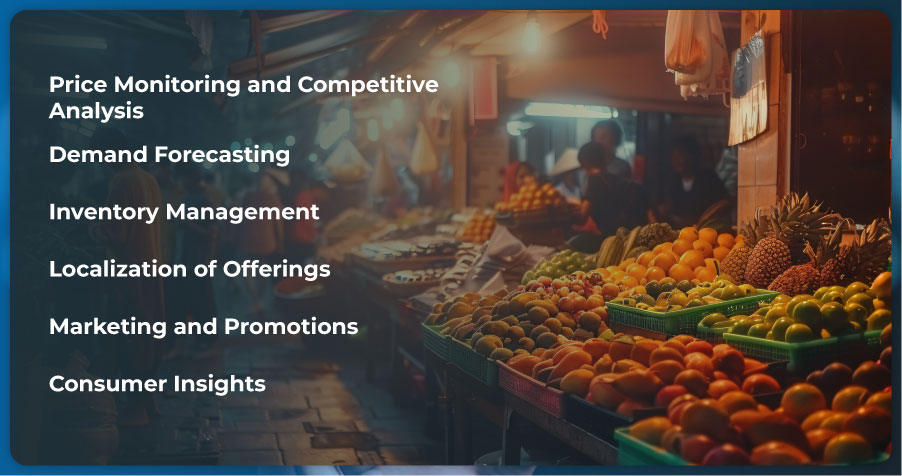
Data scraping in the Arabic grocery market enables businesses to extract actionable insights on pricing, inventory, and consumer trends. By leveraging this data, companies can optimize operations, tailor offerings to regional preferences, and gain a competitive edge in the market.
- Price Monitoring and Competitive Analysis: Through Supermarket Grocery Data Scraping, businesses can track real-time pricing across competitors. By analyzing price points for various categories and subcategories, companies can adjust their pricing strategies to stay competitive. Scraped data can also power tools like a Grocery Price Dashboard, enabling businesses to visualize pricing trends and make data-driven decisions.
- Demand Forecasting: Seasonal and cultural events, such as Ramadan, significantly influence grocery demand in the Arabic market. Leveraging Web Scraping Quick Commerce Data helps businesses predict trends and stock up on high-demand items like dates, sweets, and special cooking oils.
- Inventory Management: Scraped data on product availability using a Grocery Delivery Scraping API Services enables businesses to optimize inventory. For instance, identifying frequently out-of-stock subcategories (e.g., organic herbs) helps guide efficient restocking, minimizing overstocking or spoilage losses.
- Localization of Offerings: Arabic grocery markets are highly regionalized. Preferences in Saudi Arabia may differ significantly from those in Morocco. With Grocery Pricing Data Intelligence, businesses can tailor offerings to match regional tastes, creating a competitive advantage.
- Marketing and Promotions: Scraped data highlights trending products or items frequently purchased together. Businesses can design promotions by analyzing such trends through a Grocery Price Tracking Dashboard, such as bundling spices with pantry staples or offering discounts on seasonal goods.
- Consumer Insights: Analyzing reviews and ratings on grocery platforms provides qualitative insights into consumer preferences and satisfaction. Supermarket Grocery Data Scraping ensures businesses receive actionable feedback, enabling them to enhance product offerings and meet consumer expectations more effectively.
Challenges in Scraping Arabic Grocery Data
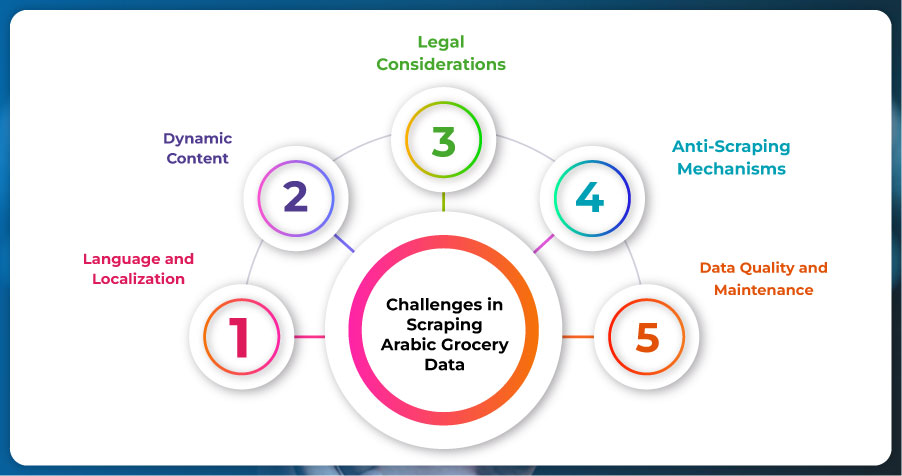
Despite its benefits, scraping data in the Arabic grocery market comes with challenges:
- Language and Localization: Many grocery websites in the Arabic market are bilingual, offering content in Arabic and English. Scraping these sites requires handling right-to-left (RTL) text and ensuring accurate translation of product names and descriptions.
- Dynamic Content: Many websites use dynamic content loading techniques, such as AJAX or JavaScript, making it more complex to extract data effectively.
- Legal Considerations: Websites may have terms of service prohibiting scraping. Businesses must ensure compliance with these terms and regional data protection laws.
- Anti-Scraping Mechanisms: Platforms often deploy measures like CAPTCHAs, rate limiting, and IP blocking to prevent scraping. Businesses need robust tools and strategies to bypass these obstacles without disrupting website functionality.
- Data Quality and Maintenance: Website structures frequently change, requiring businesses to update their scraping scripts regularly. Maintaining data accuracy and completeness is an ongoing challenge.
Future Opportunities with Arabic Grocery Data
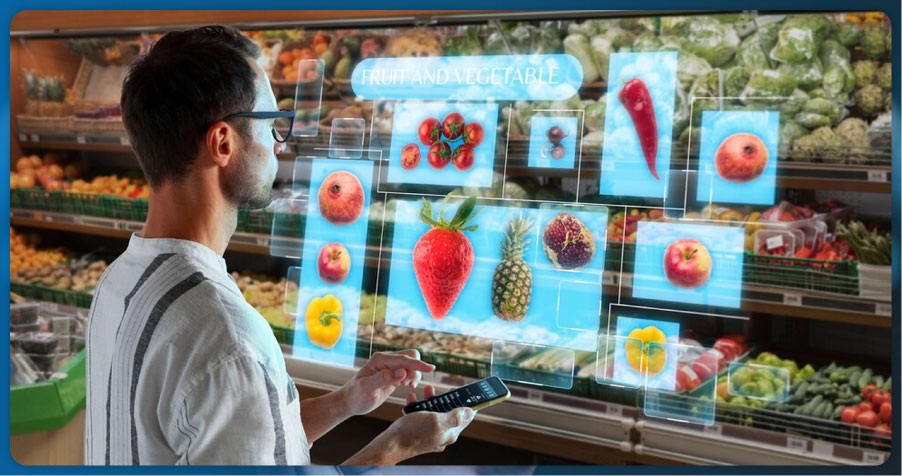
Integrating artificial intelligence (AI) and machine learning (ML) with grocery data scraping is a promising growth area. Predictive models can use scraped data to anticipate market trends, optimize supply chains, and enhance customer experiences. The rise of voice search and intelligent assistants also creates new avenues for grocery businesses to interact with consumers, requiring updated datasets for voice-enabled platforms.
Another emerging trend is the demand for Grocery Store Datasets tailored to Arabic markets. Startups, established retailers, and tech companies can use these datasets to drive innovation in grocery delivery apps, pricing tools, and recommendation engines.
Conclusion
Arabic grocery categories and subcategories data scraping is a game-changer for businesses aiming to thrive in this diverse and dynamic market. By harnessing the power of structured Grocery Store Datasets, companies can make informed decisions that drive growth and enhance customer satisfaction. While challenges like localization, legal considerations, and anti-scraping mechanisms exist, the potential benefits outweigh the obstacles. From competitive pricing to personalized marketing, data scraping offers a wealth of opportunities to unlock new levels of efficiency and innovation in the Arabic grocery industry.
As technology evolves and consumer preferences shift, the ability to adapt and leverage accurate data will determine success in this competitive market. Businesses that invest in robust data scraping solutions and effectively utilize insights from Arabic grocery data will undoubtedly stay ahead in the race for market leadership.
Are you in need of high-class scraping services? Food Data Scrape should be your first point of call. We are undoubtedly the best in Food Data Aggregator and Mobile Grocery App Scraping service and we render impeccable data insights and analytics for strategic decision-making. With a legacy of excellence as our backbone, we help companies become data-driven, fueling their development. Please take advantage of our tailored solutions that will add value to your business. Contact us today to unlock the value of your data.






















































































